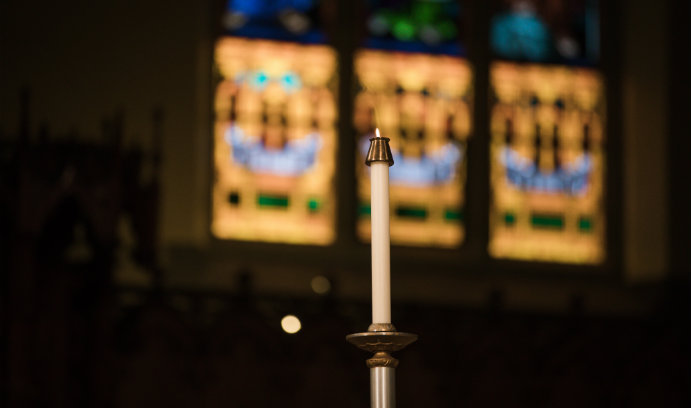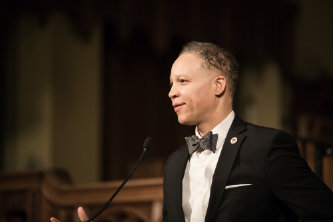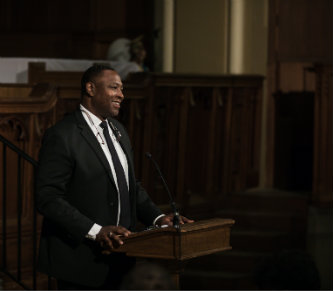Lehigh Marks 50th Anniversary of MLK in Mid-Day Memorial

Speakers at the memorial gathering included faculty, staff, students and community members. Many shared favorite writings of Dr. King's and some shared original works.
Members of the Lehigh community gathered in Packer Memorial Chapel on the 50th anniversary of the assassination of civil rights leader Martin Luther King Jr. to honor his memory, his activism, and his lasting impact.
The hour-long event took place on a gloomy rainy afternoon, as a gentle rain fell on those who filed into the chapel. Professor and University Chaplain Lloyd Steffen, who chairs the university’s MLK Committee with Office of Multicultural Affairs Director Dahlia Hylton, noted in his opening comments that while it’s important to celebrate his legacy, it’s also important to note that he left us through an act of violence.
“He was more than a dreamer on the steps of the Washington Memorial,” he said. “He was an activist for change.”
Tahya T. Keenan, artistic assistant in the Zoellner Arts Center, read a poem written by Maya Angelou, whose birthday today Keenan shares. Angelou’s poem, which was written in 2011 for the opening of the Martin Luther King Memorial, included the following:
“All creeds and cultures were comfortable in his giant embrace. And all just causes were his to support and extol through sermons and allocutions, with praise songs and orations. He preached fair play and serenity from hand cuffs and prison garb, from leg irons and prison bars. He taught triumph over loss, and love over despair. Hallelujah over the dirges and joy over moaning. Fear not, we’ve come too far to turn back. We are not afraid, and we shall overcome. We shall overcome. Deep in my heart, I do believe we shall overcome.”
Donald Outing, Lehigh’s inaugural vice provost for Equity and Community, shared a memory from his childhood, when his parents first learned of King’s assassination.
“I don’t remember all that I felt that day, but I often went back to that time to find out what was happening,” he said. “And I wanted to share something from Dr. King’s writings that I found very appropriate for what is happening today: ‘History will have to record that the greatest tragedy of this period of social transition was not the strident clamor of the bad people, but the appalling silence of the good people.’ ”
Vice Provost for Student Affairs Ricardo Hall spoke of the fleeting nature of life, which can be changed forever in a matter of seconds, and recited a poem by Dr. Benjamin E. Mays: "I've only just a minute. Only sixty seconds in it. Forced upon me, can't refuse it. Didn't seek it, didn't choose it. But it's up to me to use it. I must suffer if I lose it. Give an account if I abuse it. Just a tiny minute. But eternity is in it."
Speakers also included students, faculty and staff who shared personal observations, their own work, and favorite quotes. Community members included Josh Berk, director of the Bethlehem Public Library, and his colleague Matt Wolf, the library’s information technician. Berk read from one of King’s first writings as an undergraduate student, where he pondered the purpose of education: “To perform in the life of a man and in society, the one is utility and the other is culture.”
Berk said that King warned of a “mental life invaded by legions of half-truths, prejudices and propaganda,” and of a threat posed by those who exploit a willingness to accept that. “The most dangerous criminal,” King wrote, “may be the man gifted with reason but with no morals.”
Wolf also drew on the work of Angelou to honor King, reading from a poem written by her on the death of acclaimed novelist and social critic James Baldwin titled, “When Great Trees Fall.” Wolf read: “Great souls die and our reality, bound to them, takes leave of us. Our souls, dependent upon their nurture, now shrink, wizened. Our minds, formed and informed by their radiance, fall away. We are not so much maddened as reduced to the unutterable ignoranceof dark, cold caves.
“And when great souls die, after a period peace blooms, slowly and always irregularly. Spaces fill with a kind of soothing electric vibration. Our senses, restored, never to be the same, whisper to us. They existed. They existed. We can be. Be and be better. For they existed.”
Later today, a public march organized by the Bethlehem Chapter of the NAACP will be held. The march will begin at Parow Plaza at City Hall, and proceed to the Rev. Dr. Martin Luther King Park on Carlton Avenue in South Bethlehem.
A national bell ringing organized by the National Civil Rights Museum at the Lorraine Motel and the King Center will note the moment of King’s death. Beginning at 6:01 p.m. CST, bells will be tolled at the Lorraine Motel site. At 6:03 p.m. CST, bells will ring throughout Memphis, followed by bells tolling across the country at 6:05 p.m. CST. The passage of the minutes between the tolling will replicate the way news of King’s assassination reached the nation in 1968.
Photos by Christa Neu
Posted on:



